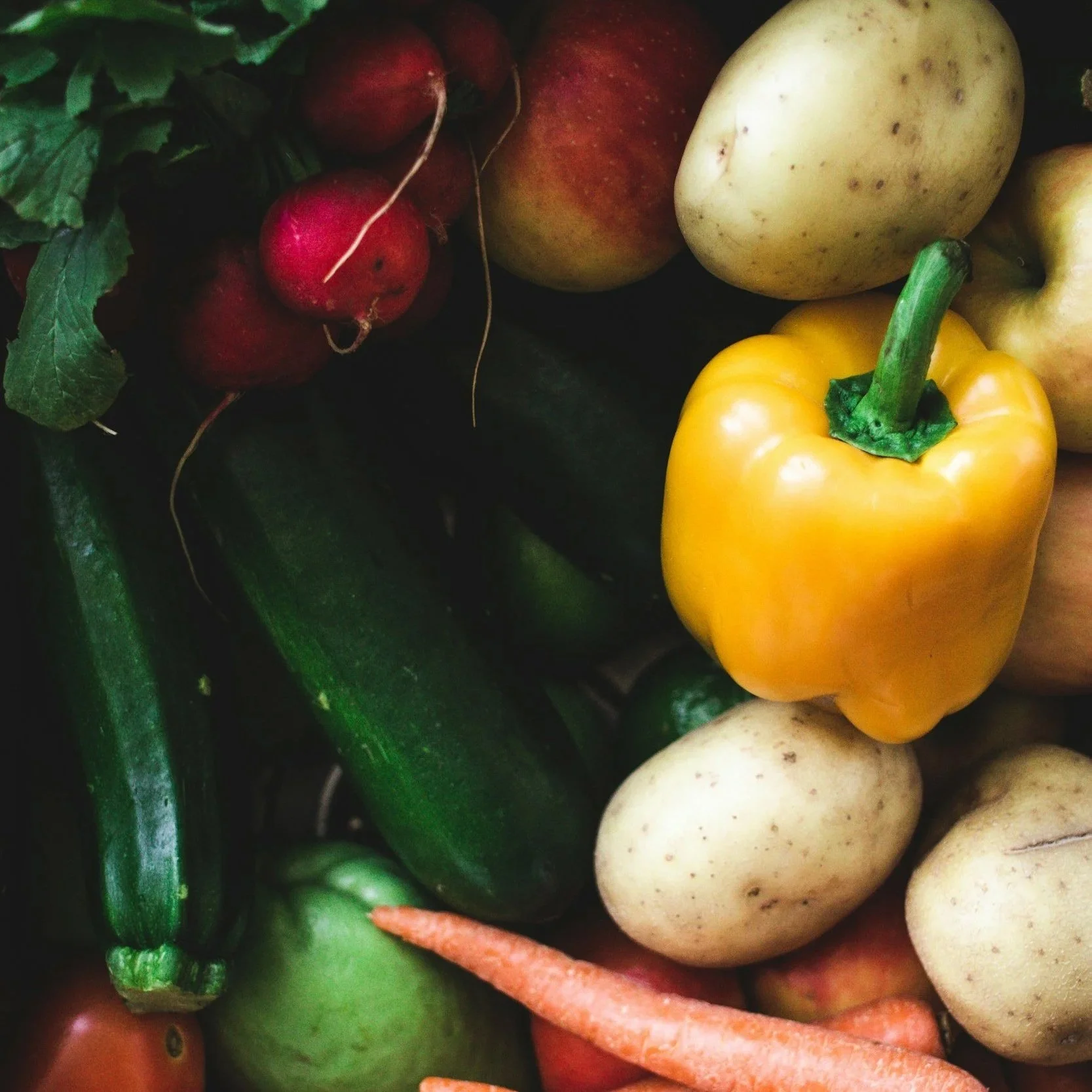Fertility-Friendly Foods: What to Eat When Trying to Conceive
This blog post may contain affiliate links. At no cost to you, I may earn a small commission off products purchased through these links.
The information in this blog post is meant to be educational and is not meant to be a substitute for medical advice.
When you’re trying to conceive, it’s easy to get caught up in ovulation strips, fertility apps, and timing everything just right, but your nutrition is one of the most powerful (and often overlooked) tools you have to boost fertility naturally.
What you eat can directly influence your hormones, egg quality, ovulation, and even how your body handles stress. Food isn’t just fuel, it’s information for your body. It tells your reproductive system whether you’re nourished and safe enough to conceive.
If you’re wondering what to eat to get pregnant naturally, let’s simplify it. Fertility nutrition isn’t about perfection, it’s about providing your body with the nutrients and stability it needs to thrive.
Why Nutrition Matters for Fertility
Your reproductive system is deeply connected to your thyroid, adrenals, liver, and gut. When any of these systems are under stress, fertility often takes a back seat.
Your body is incredibly wise. It will always prioritize survival over reproduction. If it senses depletion or imbalance, it reads that as “not a safe time for pregnancy.”
The good news? You can change that signal through the foods you eat. A fertility-friendly diet helps stabilize blood sugar, reduce inflammation, and support hormone production, creating the internal environment your body needs for conception.
Key Nutrients That Support Fertility
These key nutrients lay the foundation for a strong and healthy reproductive system:
Protein – for hormone production, ovulation, and cervical mucus
Healthy Fats – support ovulation, hormone balance, and inflammation reduction
Fiber – needed for gut health and estrogen metabolism/detoxification
B Vitamins (especially B6 & folate) – aid progesterone production and early pregnancy support
Minerals (potassium, magnesium, zinc, iron, copper, etc.) – essential for hormone signaling, the body’s stress response, liver detoxification, egg health
Antioxidants (vitamin C, E, selenium) – protect eggs and sperm from oxidative stress
Including these nutrients daily through whole foods that support fertility helps strengthen every part of your reproductive health.
Fertility-Friendly Foods to Boost Fertility Naturally
Let’s break it down by category so you can easily build your fertility diet plan.
1. Protein-Rich Foods
Protein is the building block for hormones and enzymes. It also helps stabilize blood sugar — a key part of balancing estrogen and progesterone.
Aim for a mix of clean animal based proteins throughout the week:
Pasture-raised eggs – rich in choline and B vitamins
Grass-fed beef or bison – great sources of iron and zinc
Wild-caught salmon or sardines – high in omega-3 fatty acids
Organic chicken or turkey – lean, clean protein
Bone broth or collagen – support gut and joint health
💡 Include protein with every meal to stabilize blood sugar and support fertility hormones.
2. Healthy Fats for Hormone Health
Healthy fats are crucial for hormone production and ovulation. Without enough, your body may struggle to make hormones like estrogen and progesterone.
Focus on low processed, anti-inflammatory fats such as:
Avocados
Extra virgin olive oil
Coconut oil
Grass-fed butter or ghee
Nuts and seeds (walnuts, pumpkin, flax)'
Fatty fish like salmon or mackerel
🚫 Avoid processed seed oils (canola, soybean, corn) . They can contribute to inflammation and oxidative stress, which can negatively impact egg quality.
3. Complex Carbohydrates
Carbs aren’t the enemy. In fact, your hormones need them. Choosing slow-digesting, nutrient and fiber-rich carbs helps keep insulin and cortisol balanced, both key for fertility.
Include:
Sweet potatoes, squash, root vegetables
Quinoa, and wild rice
Lentils and beans
Fruit (especially antioxidant-rich berries)
🍠 Pair complex carbs with protein and healthy fats for steady energy and better hormone support.
4. Colorful Fruits/Vegetables
These are your body’s natural detoxifiers. Rich in antioxidants and minerals, they protect eggs and sperm from oxidative damage.
Eat a variety of colors daily:
Spinach, kale, Swiss chard – folate & magnesium
Beets – support liver detox and uterine blood flow
Bell peppers, carrots, sweet potatoes – beta-carotene for hormone balance
Broccoli and Brussels sprouts – support estrogen metabolism
Berries- antioxidants to support egg health
🥦 Lightly cook or drizzle with olive oil or grass-fed butter to improve nutrient absorption.
5. Mineral-Rich Foods
Minerals are foundational for hormone function and ovulation. Without enough magnesium, calcium, potassium, or sodium, your body struggles to maintain fertility balance.
To support mineral levels:
Add quality sea salt to meals
Drink coconut water or mineral-rich electrolytes
Eat those colorful fruits/vegetables listed above for mineral support
Include bone broth weekly
✨ A Hair Tissue Mineral Analysis (HTMA) can reveal your mineral status and help personalize your fertility nutrition plan.
6. Foods for Gut & Liver Support
Your gut and liver are central to hormone metabolism and nutrient absorption — two things you need working well to conceive.
Add these foods to your fertility diet:
Fermented foods like sauerkraut, kimchi, or kefir
Fiber-rich vegetables and seeds
Cruciferous veggies for estrogen balance
Lemon water or dandelion root tea for gentle liver support
💛 Your liver helps process excess hormones. Keeping it supported can improve overall fertility.
Sample Fertility Meal Plan: A Day of Nourishing Choices
Here’s an example of what a day of fertility-friendly eating could look like:
Breakfast:
Three pasture-raised eggs mixed with cottage cheese (cooked in butter) + spinach and sweet potato hash + avocado
Snack:
Greek yogurt + berries + pumpkin seeds
Lunch:
Quinoa salad + salmon + arugula + roasted beets + olive oil dressing
Snack:
Apple slices + almond butter + sprinkle of sea salt and cinnamon
Dinner:
Grass-fed beef stir fry + broccoli + bell peppers + jasmine rice (cooked in bone broth)
This isn’t about perfection, it’s about consistent nourishment. Each balanced meal tells your body: “You’re nourished, safe, and ready.”
Foods to Avoid When Trying to Conceive
A few foods can disrupt hormone balance and increase inflammation, making conception harder.
Try to minimize:
Refined sugar and processed foods – spikes insulin and stress hormones, can contribute to inflammation
Excess caffeine – disrupts cortisol and sleep (limit to one cup daily)
Alcohol – overburdens the liver and affects estrogen balance
Processed seed oils – can contribute to inflammation and oxidative stress that impacts egg and sperm health
✅ Focus on adding in more whole, nutrient-rich foods rather than fixating on restriction. You can still enjoy foods you love, while eating a balanced diet.
Your Next Steps
When it comes to ways to boost fertility naturally, your diet is one of the most powerful tools you have. Every balanced meal sends your body the message:
“You are safe. You are supported. You are ready.”
This isn’t about “superfoods” or temporary cleanses. It’s about nourishing your body consistently so it can do what it was designed to do.
If you’re unsure where to start or want deeper insight into your personal hormone or mineral patterns, functional testing like Hair Tissue Mineral Analysis (HTMA) or the DUTCH hormone test can uncover the root causes of imbalance and help you create a clear, customized roadmap to conception.
Because fertility isn’t just about getting pregnant, it’s about helping your body thrive so life can flourish naturally.
👉 Take my free Hormone Quiz to learn where your hormones may be out of balance and how to support your fertility naturally from the inside out.




